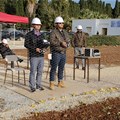Digital transformation works! Just ask the trees...
No, the impact of 21st-century digital technology is wholesale. If you need proof, look no further than the stoic and conservative world of forestry. Even here, new technologies are encouraging not just better processes and efficiencies, but complete overhauls of business models - and it is very potent.

In the words of Celeste Rogers, CIO of the MTO Group, “At the start, we needed to shift people’s minds. Now we can’t keep up with demand! As other parts of the business realise what could be achieved, they want to hit the ground running.”
New Age Trees
Today MTO’s managers are thrilled with the ways they can oversee and handle operations. Even though Rogers regards MTO’s transformation as at its beginning stages, the effort from the past few years is bearing fruit. After diligently investing in changing MTO’s own IT culture to adopt the more dynamic world of new digital thinking, she and her team began developing platforms that underpin MTO’s processes.
One of the first evident outcomes is a heightened level of operational awareness. MTO’s forestry services are spread across many locations, divided into various teams of contractors and own operations that manage different aspects of the plantations. Normally that complexity only made sense at monthly intervals, when managers could collate reports around activities.
But through the new digital platforms, this is shifting to daily reporting, explains Rogers,
“We developed apps that work on smartphones, on which staff capture important metrics. These are fed into the platforms, where the data is made available for higher level managers. They record the size of teams, activities of the day, consumable usage, and a growing number of metrics. One project we’re working on is to increase this to a real-time level which gives managers much better visibility for their planning.”

Innovation teams are all over the company: these largely consist of non-IT staff who mull the opportunities in front of them but include some IT people to help guide the realistic responses digital can provide. In short, MTO’s people have been able to take the reins of digital and lead it forward. It’s a fantastic case study of how to adapt to the new norms of business.
Cutting the way forward
Why is the new digital order so powerful? Certainly for its flexibility. Rogers reiterated the challenge of MTO’s many different sites and operating models. That diversity is expensive and complex to shoehorn into the hardened IT systems of the past.
But a digital platform approach has the opposite result: operations, projects and processes can perform at their best, because they have room to breathe and evolve. No wonder companies that can harness digital sing its praises.
“Our executives, in particular, are strongly pushing digital,” said Rogers. “And it sits very close to our operations and finance executives, who can see the real benefits it produces. It took time to change minds and we couldn’t do it without leaders backing us. But people are starting to see the value and it’s created a hunger for more.”

MTO still has legacy systems and the transition into full digital is an ongoing journey. Apart from more real-time views of operations, Rogers and her team also aim to eventually expand into deep Internet of Things projects, such as monitoring forest environments and equipment health. They are also working on a means to give more capabilities to MTO’s growing family of partners and contractors. MTO itself is not just about forestry and continues to diversify. Digital is a major catalyst for that momentum.
We can book rooms online and stream our favourite TV shows, lamenting how digital has changed those industries. But MTO’s experience makes it clear that no business will be left untouched. Digital is not a threat - it’s an incredible opportunity. Of course, those who don’t take the opportunity will lose to the competitors that do, Rogers concluded:
“Driving digital wasn’t for the advantages, but because we were aware that the world is changing. If MTO wanted to remain relevant, we had to change too. Now we are - and it’s more amazing than I ever expected!”




























